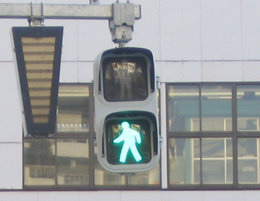When a foreigner comes to live in Japan, he or she is in for some changes. I remember my first hours in this country back in 1991, gazing out the window of the train from Narita Airport to Tokyo and thinking — stupidly — how the beautiful “kawara” tiles on all the houses made them look, well, very Japanese. My next bit of culture shock was seeing more vending machines in one city block than were installed in my entire university back home — and that’s not even counting the ones selling beer. Japanese homes are smaller than those in the U.S. and make use of space more efficiently, however this means that stairs tend to be steeper and much more dangerous if you have a fall. There are plenty of other large and small surprises for a gaijin moving to Japan. People riding bicycles while holding an umbrella over their heads, or using umbrellas in the snow. Toilets with a faucet in the top to let you wash your hands with the clean water as it flows into the tank. The strange custom of crosswalks to play “Comin’ Through the Rye” when it’s time to cross, as an aid for blind people. Perhaps the biggest surprise of all is how used to Japan a person can get, a thought that occurred to me last night while I was sitting at the kotatsu wearing my yukata, enjoying a beer and some saki-ika, dried, shredded “squid jerky” that gets more delicious the longer you live here.

When you learn a language as different from English as Japanese is, you sometimes run into words or phrases that can’t be easily translated from one side to the other. My wife, who is not mechanically inclined, bought an Alpine car stereo for her BMW but complained to me that it didn’t have a CD player. It took me less than a full second to look at her stereo, guess that there must be a front panel that hides the CD slot, and verify this by pushing the panel out of the way, revealing the slot. “How did you know to do that?” she asked me, and I replied, “Nantonaku.” This is a word that’s very hard to pin down in English, and itself speaks volumes about how full of subtle nuances the Japanese language can be. Literally meaning “somehow” or “some way,” nantonaku (pronounced NAHN-toh-NAH-koo) is used in vague situations when you can’t pin down a concrete reason for something. It could be translated as “without thinking about it” “without deep consideration,” or in the case of me figuring out my wife’s car stereo, “I just knew.” If you love movies directed by Ron Howard but aren’t sure why, you might use the phrase “nantonaku suki,” or if the dreamy art of Japanese illustrator Range Murata calms you, you might use the phrase in that situation, too. It’s probably a word most Japanese wouldn’t expect a foreigner to know, so if you want to surprise a Japanese person, try pulling out the word and watch the look of shock on their faces.
February is month of Valentines Day, when girls and women throughout Japan will be thinking about which chocolates to give to their boyfriends, husbands and fathers. It’s is also the height of Juken Season, when millions of Japanese students will be taking their college entrance exams that will determine what university (for current high school students) or what high school (for current junior high students) they will attend. It’s one of the most important moments in the life of a Japanese person, and students aiming for the best schools have studied for years in preparation. Japan has had a long tradition of requiring tests to gain admittance to universities, government jobs, and other high-ranking positions, and while the system isn’t perfect, it’s certainly better than letting the son of whoever has the most money or power get special treatment — by and large, the tests are a real mechanism of Democratization here. Another benefit of Japan’s test culture is the effect it has on young people, forcing them to set goals and really reflect on their education during some very impressionable and potentially dangerous years. I’m convinced all human beings have a “bad judgement gene” that kicks in between the ages of 16-22 or so, when young people will be compelled to do things that aren’t in their overall best interests (apologies to young people reading this, who will insist that there is no such gene, but will then realize that I was right when they get to their mid-20s or so). Because of the focus on tests, a large number of Japanese are busy dedicating themselves to their studies when they might otherwise be out getting into trouble.
We’ve got a new wacky Japanese T-shirt for fans of Japan’s “otaku” culture, a word which describes the current generation of fans of Japanese anime, manga and other forms of popular culture from the Land of the Rising Sun. Our new shirt features a replica of a sign visible in every train station in Japan, showing “Otaku” as the current train station, with O-Daiba (the area where the famous Comic Market doujinshi convention is held) displayed as the previous station and Akihabara (Tokyo’s electronics and otaku culture Mecca) as the next stop. A great new kanji shirt design for otakus all over the world — check it out now!















